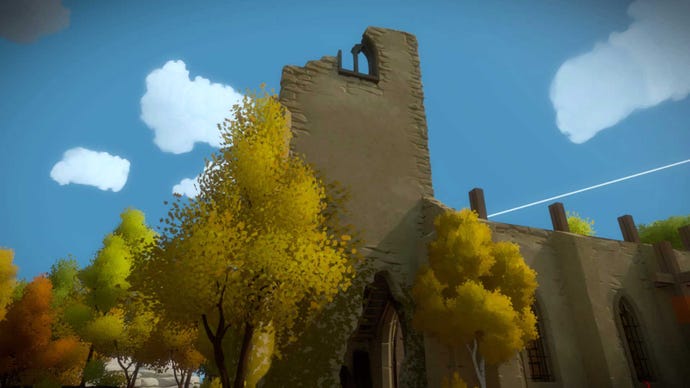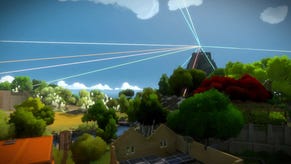Inaccessible: what I should have said in my review of The Witness
The Witness highlights an industry-wide issue of privilege and thoughtlessness. Let's try to do better.
The Witness gets away with its colour and audio issues, but it’s only comfortably able to do that if it’s an outlier. We can accept that not every game is right for us when there are plenty of others that are. And that’s not necessarily the case.
There's something I want to say about The Witness that I didn't say in my review: if you have one of the many visual conditions typically (and misleadingly) described as colour blindness, you can't finish this game without assistance. If you can't hear, or can't hear tones, you can't finish this game without assistance.
This message has gone out pretty widely now, and indeed started spreading shortly after launch - here's Kotaku and Gamespot, just for a start. But it didn't go out at or before launch; it didn't go out before players laid down their cash.
Why not? There are a couple of reasons so few reviewers made mention of it. First, despite best efforts, most players wouldn't have actually finished the game before the embargo went up; it has over 600 puzzles after all. Second, you could argue that mentioning these drawbacks spoils the game a little; even more than solving individual boards, figuring out the rules of the various puzzle variations is one of the prime joys of The Witness.
But third, and likely most importantly: we just didn't think of it, because it doesn't personally affect us. Qualified people may use the "p" word here.
I didn't think about these problems until I came up against one myself. I don't have a very good ear for pitch and tone (oh boy, wow, no, I don't want to go to karaoke) and I struggled massively with the audio cues in the Jungle. Several of my family members are deaf, and it occurred to me that they'd have absolutely no idea how to go about solving these puzzles. This finally kicked off dormant processes in the back of my mind and made me look around the puzzle boards, realising how many of them would be literally impossible with non-standard colour vision.
Just to make things even more embarrassing for me personally, an interview feature of mine ran shortly after The Witness launched. In it, Jonathan Blow said a lot of things that jog along nicely with my own personal opinion that attempts to appeal to the broadest possible mainstream audience makes for very dull games. It's okay not to focus on accessibility, I argued, because not every game needs to be for everyone.
Clearly, I forgot that the word accessibility has another meaning besides the concepts of difficulty and blandness we regularly reference with it. Awkward.
This article is not about me falling on my own sword and shedding able-bodied tears everywhere to show off what a good ally I am. And it's also not meant to be a flaming critique of The Witness. Unlike your run of the mill shooter or MOBA, The Witness has a pretty good excuse for failing to accomodate all kinds of potential players; significant segments of the game are designed specifically around using specific faculties, rather than these faculties being taken for granted. I still think it's okay that not every game has to be for everyone; I think it's okay that there's a game like The Witness that leverages colour vision and hearing, and that means some people won't be able to play it (or play all of it).
Although traditional games media (myself included) dropped the ball here, there are, thankfully, resources specifically catering to disabled gamers. At least a dozen of websites focus on assessing games based on their accessibility to people with all kinds of disabilities (Does it have colourblind visual options? Are there subtitles - and do they actually work? Can the controls be remapped?) as well as informing developers on how they can build accessibility into their games. Charities AbleGamers and Special Effect even work to provide physical solutions to accessibility problems. Potential players who know they're likely to run up against problems can check in with these resources, where experts do a much better job than I ever could of unpacking the strengths and weaknesses of various games.
So I guess you could say it's okay that non-accessible games exist, because not every game needs to suit everyone, and it's okay that mainstream games media regularly fails to consider accessibility issues when informing consumers about new products; not ideal, by any means - just okay. I bet it's super frustrating to read that a game you've been anticipating doesn't cater to you, but only a minority of players are affected, right?
Well. Coming back to The Witness, someone left a comment on one of the guide pages saying some of the puzzle boards in the Mountain can trigger photo-sensitive epilepsy, and the original build causes motion sickness in pre-disposed players. Although only a minority of players are affected by these issues, we expect Thekla to fix them (and indeed it's already working on at least one of them). We would expect any developer to. We don't just say oh well, if you're built this way, you have to deal with the consequences or not play at all - after all, you're in the minority, and it's only a game. Why don't we extend this same expectation to other issues, when a game doesn't rely on colour or sound for essential gameplay mechanics?
As I've said, I think The Witness gets away with its colour and audio issues because they're kind of the point of the game (although I certainly feel these matters should be broadcast by developer or press or both so consumers are aware of them). But it's only comfortably able to do that if it's an outlier, if it's an exception to a rule. We can accept that not every game is right for us when there are plenty of others that are, you know? And while there are plenty of games than handhold you, providing a huge pool of alternatives to The Witness for those who finds its self-directed learning painful, that's not necessarily the case when it comes to looking for games that cater to various disabilities.
Very few other games have The Witness's mechanical excuses, and yet the majority fail to make any effort towards accessibility. Up to 10% of bio men in the western world have one or another form of non-standard colour vision; that's smack bang in the middle of the industry's favourite demographic, but most games don't bother to acknowledge it. This is even more damning when you understand that, thanks to the resources and freely-provided expertise available to developers, it's relatively simple to introduce accessibility solutions - colour filters, subtitles, visual UI substitutions for audio cues, key binding options. All you have to do is have that initial thought, that little spark of empathy, and then make the effort to act on it.
We're seeing more and more games make these baseline concessions, and we should applaud it whenever we see it - and remember to notice and mention it when it's absent. It's only by continuing to have these conversations that the world gets a little bit better.




















